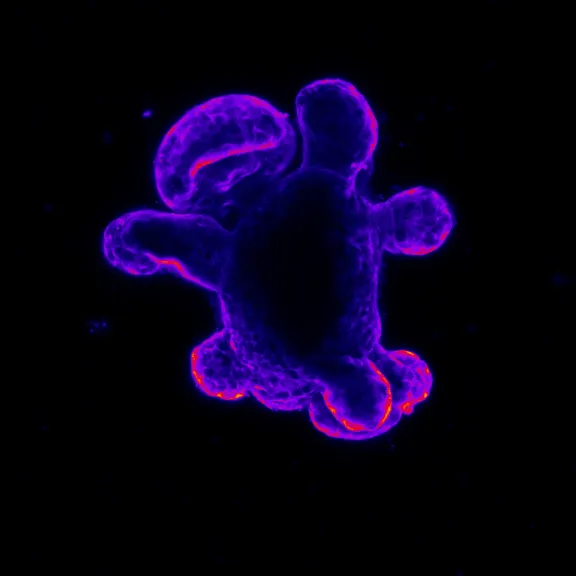Meryem Baghdadi The importance of the mechanical niche for intestinal stem cells
CNRS researcher, head of the "Stem Cell Niche and Development" team, Institut Necker Enfants Malades (INEM), Paris
- 2024 • ATIP-Avenir Program



The activity of stem cells, which can renew themselves and transform into different cell types, depends very much on the immediate environment surrounding them, known as the niche. Meryem Baghdadi is particularly interested in the mechanical properties of this environment, such as rigidity and tension. She is studying how these properties influence the appearance and function of intestinal stem cells during embryonic development, as well as their contribution to the development of diseases.
Stem cells need their niche
The layer of cells lining the intestine, known as the intestinal epithelium, is constantly renewing itself and has an exceptional capacity for regeneration in the event of injury. The intestinal epithelium is organized into millions of folds (villi) and hollows (crypts). The intestinal stem cells, which maintain and repair the epithelium, are located at the bottom of the crypts. The remarkable properties of these cells, such as proliferation, self-renewal and differentiation, are controlled by signals from the surrounding environment, the niche.
Mechanical tension in the intestine
Crypts have a specific geometry and composition that contribute to the rigidity and tension of the tissue. Meryem Baghdadi wants to understand how stem cells integrate mechanical signals from their environment to maintain their balance, and how this is deregulated in intestinal pathologies. On the surface of adult intestinal stem cells, she recently found elements (PIEZO ion channels) that are essential for sensing the mechanical properties of their niche, in order to maintain the functions of the intestinal epithelium. Currently, with her recently created team, she is focusing on a key stage in the establishment of the properties of the intestine: embryonic development.
Mechanics in disease
Meryem Baghdadi and her team will use multidisciplinary approaches combining molecular biology, bioengineering and different animal models to measure and modify the physical forces exerted on cells. In particular, she will use organoids, a kind of "mini-intestine" that recreates crypts in vitro, along with the main cells found there, including stem cells. They will also use genetic and pharmacological tools to manipulate PIEZO channels and other components of environment-sensing signaling pathways.
Deciphering the signals that regulate the development and maintenance of stem cells will enable Meryem Baghdadi and her team to understand why the intestine does not regenerate in cases of necrotizing enterocolitis, a severe inflammatory disease that affects premature babies. This developmental disease is characterized by inflammation, tissue death and a lack of stem cells.
By revealing the complex links between mechanical signals from the environment and the behavior of stem cells, Meryem Baghdadi will pave the way for new therapeutic strategies based on manipulating the mechanical properties of the stem cell niche.
Meryem Baghdadi in a few words
Meryem Baghdadi has been interested in stem cells since the beginning of her scientific career. She began with muscle stem cells during her doctoral work at the Institut Pasteur (Paris), then intestinal stem cells during her post-doctoral fellowship between 2018 and 2021 at the Hospital for Sick Children (SickKids) in Toronto (Canada). She returned to France to work at the Institut Curie (Paris), before joining the CNRS in 2022.
From 2025, Meryem Baghdadi will set up her own research team at the Institut Necker Enfants Malades (INEM), with support from the ATIP-Avenir program. She has won several awards, including the Prix Jeunes Talents France 2024 (L'Oréal-UNESCO Foundation), and the young researchers prize of the Société Française de Biologie cellulaire 2024.